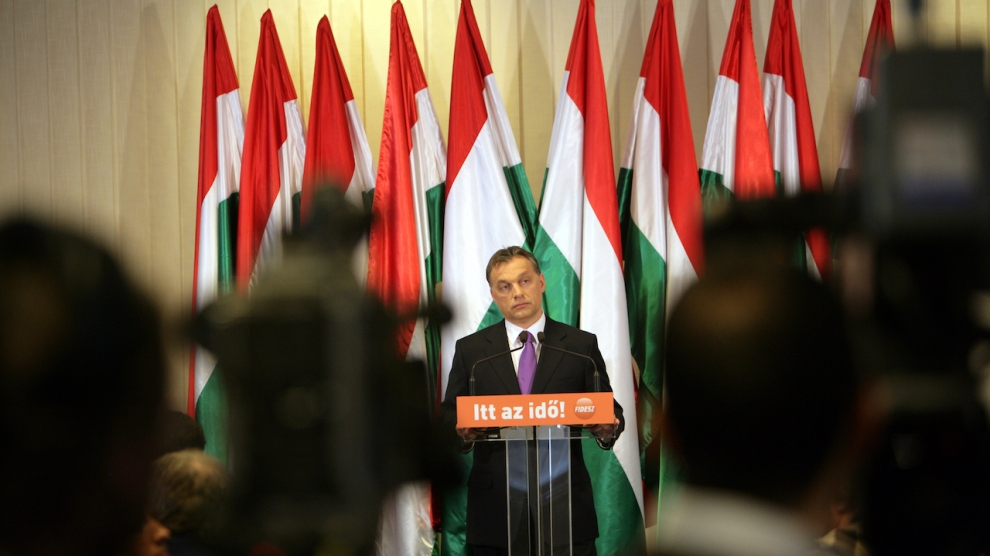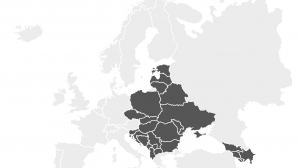Romania’s ruling Social Democratic Party (PSD), which has been heavily criticised over its backsliding in the fight against corruption, suffered a major defeat. Support for the party now stands at only 25.8 per cent compared to the 45,7 per cent it received in the general election in 2016. What’s more, an overwhelming 81.1 per cent of Romanians rejected the government’s “special decrees” granting corrupt officials an amnesty in a referendum put forward by centrist president Klaus Iohannis, who strengthened his position ahead of the country’s presidential election at the end of 2019.
The European election was also a failure for the ALDE party, the minor member of the ruling coalition whose leader openly called for a boycott of the president’s referendum. Having been expelled from the European Parliament’s liberal ALDE group only a day before the European vote, it failed to make the five per cent threshold necessary to take any seats in Brussels and Strasbourg.
The day after the European election, Romania’s highest court upheld the conviction of PSD leader and de-facto head of the government Liviu Dragnea, sentencing him to three years and six months in prison. The party immediately did a U-turn and started to distance itself from politicians affiliated with corruption, as well as their policies.
The move was viewed positively by the European Commission that welcomed prime minister Viorica Dăncilă’s promise to abandon controversial judicial reforms. Any concrete EU action against Romania’s government while the country holds the EU’s rotating presidency would have been a major a blow to its reputation.
The PSD has also faced threats of expulsion from the Party of European Socialists (PES). However, sources in the EU parliament told Emerging Europe that following Mr Dragnea’s conviction, the relationship is now conciliatory.
Poland’s ruling party is on course for re-election
In Poland, EU elections brought a reaffirmed legitimacy to the country’s populists. The ruling Law and Justice party (PiS) managed to preserve its leading position in the political arena, securing 45.4 per cent of the vote while the European Coalition, the united front of opposition parties that has since started to fall apart, secured only 38.5 per cent. In addition, the social democratic Wiosna party led by Robert Biedroń, that was not part of the coalition, was unable to create a new front in Polish politics.
The result came as a surprise as some polls predicted a double-digit lead for the European Coalition, especially after a new documentary about child abuse in the Polish clergy sparked controversy within Poland’s conservative society.
The result gives PiS, which has managed to mobilise its rural and moderate supporters by expanded social spending and running a pro-family campaign, a strong political boost as the Polish public is now turning its eye to the country’s general election in just a few months’ time. According to the Polish media, European Council president Donald Tusk, who has been widely tipped with a return to Polish politics, is now distancing himself from the opposition.
With such the opposition so ideologically diverse, it has become clear that merely standing on common lists will not bring more votes. “The only chance of the Polish opposition to change government would be to divide themselves into two separate ideological platforms: a left-wing progressive bloc with Robert Biedroń’s Wiosna party and a conservative block where the Civic Platform could gain strength with the [agrarian] PSL and the liberal Nowoczesna party. Of this, however, there is not much chance, thus PiS has a strong chance of obtaining a parliamentary majority next autumn,” Edit Zgut, foreign policy analyst and guest lecturer at the Centre for Europe of the University of Warsaw said, adding that mobilising voters would also pose a serious challenge for anti-government forces.
Hungary’s opposition turned upside down
For most of the Hungarian public, even the opposition parties themselves, it was no surprise that the ruling Fidesz party led by nationalist prime minister Viktor Orbán would win the election, which it did so with 53.3 per cent of the vote.
However, an unexpected turn of events took place on the other side of the aisle. The socialist-liberal Democratic Coalition party and the liberal Momentum party, which previously polled at roughly ten and five per cent respectively, became the leading forces between Hungary’s multi-party opposition structure, with support for the Hungarian Socialist Party and the far-right-turned-conservative Jobbik party, decreasing dramatically. Such a diverse opposition meant that the various parties were competing not with the ruling party, but each other.
A notable consequence of Hungary’s European elections can be visibly seen in the results: those parties distancing themselves from Mr Orbán’s illiberal system in the most visible way ended up the de-facto leaders of the opposition (for now).
Momentum campaigned on a strong anti-corruption platform and brought fresh faces to Hungarian politics while the Democratic Coalition’s main message was its support for a United States of Europe, with the remaining opposition parties not really having an easily communicable political message at all.
“The current results mean a return to [political] polarity, meaning that those political forces which tried to represent a new, centrist position became weaker,” said Hungarian political analyst Gábor Török, pointing to the failure of third-way parties such as Jobbik and the Hungarian Greens.
With municipal elections scheduled for October, Hungary’s opposition is expected to go through a transformation that will either bring political consolidation and finally decide which party can be regarded as the main challenger to Fidesz, or further deteriorate, resulting in the emergence of yet another group of completely new political figures and parties from 2020.
On the EU sidelines
European heads of state and government, as well as parties in the European Parliament have now been negotiating the EU’s top four jobs: European Commission president, European Council president, European Parliament president, the EU’s high representative on foreign affairs and the president of the European Central Bank. Regardless of the disputes between the heads of EU member states and the European Parliament over the nomination procedure, it will be a difficult task to maintain a regional presence in Europe’s leadership.
French president Emmanuel Macron has reportedly offered to support Slovakian EU commissioner Maroš Šefčovič for the EU’s foreign policy chief if Visegrád leaders accept one of Mr Macron’s candidates for Commission president. Such a deal would be highly unusual as Mr Šefčovič belongs to the socialist bloc in the EU parliament, whose top candidate is current commission vice president Frans Timmermans.
Sources told Emerging Europe that European leaders may now look to the Baltics to replace Donald Tusk as European Council president. Dalia Grybauskaité, Lithuania’s outgoing president, will finish her presidential term in July. She is considered a supporter of German chancellor Angela Merkel, who has strong influence in deciding the EU’s next leadership. However, the Polish media has reported that Visegrád leaders would favour Mr Šefčovič for the position of Council president.
The relationship between Mr Orbán’s Fidesz party and the European People’s Party (EPP) also remains unresolved. After European populists failed to become a dominant force in the EU parliament, Fidesz, which was suspended from the EPP, is now pursuing a plan to remain in the EU’s most powerful political group. As a measure of goodwill, Mr Orbán even postponed the introduction of a new court system that would have seen politically sensitive cases overseen by government-appointed judges.
EPP leaders are expected to make a decision on Fidesz’s membership this summer. If they eventually let the party go, its position in the parliament would remain uncertain since it has already rejected the chance to join the far-right bloc of Italian deputy PM Matteo Salvini. An alliance with Poland’s Law and Justice party in the so-called European Conservatives and Reformists group might be the party’s only solution.






[…] A mixed outcome for emerging Europe’s populists in Europe’s election Emerging Europe […]